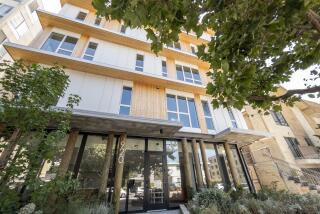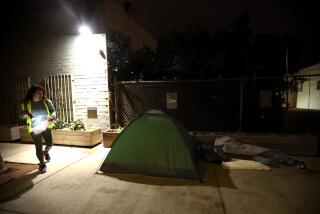What should L.A. do about homelessness? Renters and homeowners answer differently, poll finds

Poll after poll shows that just about everyone in Los Angeles believes homelessness is one of the biggest problems facing the region.
But a key factor determining what Angelenos believe needs to be done about it is whether they’re homeowners, according to a new USC survey.
Renters in Los Angeles County were at least 14 percentage points more likely to support rent control, affordable housing construction and the use of housing vouchers in their own neighborhoods than homeowners, the survey found, while homeowners backed encampment sweeps more than renters. For instance, 71% of renters in the survey said they would back affordable or public housing construction on their block compared with 53% of homeowners.
Opinions between the two groups were closer when the survey asked about general support for the policies. The survey found backing among homeowners for affordable housing construction overall was more than 20 percentage points higher than the level of support for building in their own community.
The results reflect homeowners’ and renters’ divergent interests, said Kyla Thomas, a USC sociologist and director of the university’s LABarometer survey. Homeowners, she said, are concerned about property values and are resistant to policies they believe might adversely affect them, while tenants want to see rents decrease and have more affordable housing available.
“There are a lot of homeowners in L.A. who lean left, are sympathetic to the problem of homelessness and are generally supportive of these solutions,” Thomas said. “But on a neighborhood block, they’re incentivized quite differently.”
The homeowner-renter divide was the survey’s most significant social cleavage in attitudes toward the construction of affordable housing, rent control and universal basic income, mattering more than differences in race, income and education.
The finding isn’t new. A poll of city voters conducted in the spring by the Los Angeles Business Council Institute in partnership with The Times saw similar disparities between homeowners and renters.
More than 6 in 10 renters in that survey believed that the lack of affordable housing in the city was so serious that the state government should penalize local governments that block construction. Only 42% of homeowners agreed.
The divide has substantial policy implications, Thomas said. Renters are a majority in L.A. County, according to U.S. census data, yet homeowner preferences often dominate political debates over housing.
“The constant challenge in L.A. is these competing groups, and the power disparity between those groups,” Thomas said. “Renters make up a higher percentage of Angelenos, but they’re much less economically empowered. I think that just creates this real tension.”
The LABarometer survey on livability and affordability is an annual poll that selects from a demographically representative online panel of L.A. County adults. This survey of 1,507 residents was fielded from July 24 to Oct. 15, with a margin of error of plus or minus 2.5 percentage points, and higher margins for questions among subgroups.
There are about 75,000 people who are homeless in L.A. County, 55,000 of whom are unsheltered, according to the most recent point-in-time count of the homeless population.
The survey described the pervasiveness of homelessness in Los Angeles. Of those surveyed, 82% said they see someone who is homeless on at least a weekly basis.
Nearly 1 in 10 polled said they’d been homeless themselves. Almost a quarter said they’d couch-surfed, lived in their car or a motel, or had to move in with friends or family as an adult — statuses frequently considered homeless under the federal government’s definition.
“The common experience of housing insecurity is a cornerstone of L.A.,” Thomas said.
The survey revealed warning signs about further stress on tenants. There’s been a steady upward trend among Angelenos saying they moved because their landlord raised the rent.
In October 2020, just 7.5% of those who moved in the previous year said it was because of a rent increase. That percentage has increased in each of four subsequent iterations of the survey, growing to 34.8% in this version.
During the height of the COVID-19 pandemic, many policies temporarily restricted rent hikes, including a ban on them in rent-controlled apartments in the city. But those rules have expired.
More to Read
Sign up for Essential California
The most important California stories and recommendations in your inbox every morning.
You may occasionally receive promotional content from the Los Angeles Times.







